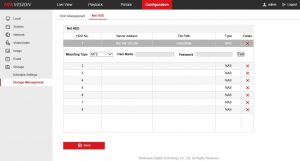For connecting Hikvision camera to NFS storage
In NFS server:
create a separate Logical Volume
example:
——————————————————————————–
--- Logical volume ---
LV Name /dev/vgcam/lvcam1
VG Name vgcam
LV UUID lxdWGO-UqBv-Da0U-dYGM-hzgJ-Zwjp-bNDLXc
LV Write Access read/write
LV Status available
# open 1
LV Size 200.00 GB
Current LE 51200
Segments 1
Allocation contiguous
Read ahead sectors auto
- currently set to 256
Block device 253:8
— Logical volume —
LV Name /dev/vgcam/lvcam2
VG Name vgcam
LV UUID Dei4BM-ePKK-383k-JO7t-F082-VBBJ-mEZQ3v
LV Write Access read/write
LV Status available
# open 1
LV Size 200.00 GB
Current LE 51200
Segments 1
Allocation contiguous
Read ahead sectors auto
– currently set to 256
Block device 253:9
————————————————————————————————
Now mount these volumes to say /cam1 /cam2
/dev/mapper/vgcam-lvcam1 on /cam1 type xfs (rw,nosuid,nodev,noexec,relatime,attr2,noquota)
/dev/mapper/vgcam-lvcam2 on /cam2 type xfs (rw,nosuid,nodev,noexec,relatime,attr2,noquota)
create a data folder in each of these e.g.
mkdir /cam1/data
mkdir /cam2/data
create and export in nfs as follows where 192.168.123.1 and 192.168.123.2 are the IPs of Cameras
/cam1/data 192.168.123.1(async,insecure,rw,nohide)
/cam2/data 192.168.123.2(async,insecure,rw,nohide)
restart nfs service
service nfs restart
Now at the camera configure screen goto
Storage
Storage Management
NetHDD Tab
Enter serverIPAddress, FilePath, Type, MountingType,Username,Password e.g
192.168.123.250 /cam2/data NAS NFS nousername nopassword
Save it
Next goto HDD Management Tab
HDD Management
It will show the attached drive as follows
HDD No. Capacity Freespace Status Type Property Progress
9 199.90GB 197.50GB Normal NAS R/W
Select this and click on Format
After completion for format command goto
System
Maintenance
Reboot
After rebooting check recording under Playback Option.
